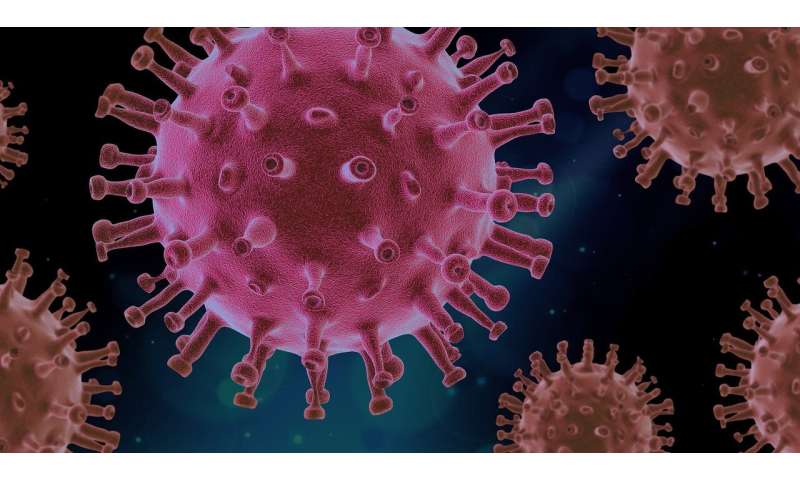
The coronavirus threatened Americans with their hardest week in memory on Monday and put Britain’s prime minister in hospital, despite early signs that some of Europe’s hardest-hit countries may be turning a corner.
Japan announced an imminent state of emergency and a trillion-dollar stimulus package, after the US surgeon general compared the likely impact of the epidemic in the week ahead to 9/11 or Pearl Harbor.
But it was a more mixed picture in Europe, where countries already ravaged by deadly COVID-19 outbreaks reported lower numbers of new infections and, in Austria and Italy, began thinking about easing lockdown restrictions.
Hard-hit Spain recorded deaths down for a fourth straight day, but still logged 637 fatalities, and France underlined the epidemic’s economic toll, forecasting the worst recession since World War II.
In London, virus-stricken Prime Minister Boris Johnson spent the night in hospital for tests, after Queen Elizabeth II delivered a rare emergency address in a 68-year reign to urge Britain to “remain united and resolute”.
The new coronavirus has reached almost every corner of the planet, confining nearly half of humanity to their homes and turning life upside down for billions on a deadly march that has claimed nearly 70,000 victims.
“This is going to be the hardest and the saddest week of most Americans’ lives, quite frankly,” US Surgeon General Jerome Adams told Fox News.
“This is going to be our Pearl Harbor moment, our 9/11 moment, only it’s not going to be localised.”
In Tokyo, Prime Minister Shinzo Abe said hospitals face a “critical situation” and an emergency could be declared as early as Tuesday.
“We’re currently seeing rapid increases of new infections particularly in urban areas like Tokyo and Osaka,” he said.
But there was hope in parts of Europe after a weekend that saw Italy reporting its lowest death toll in two weeks and France its fewest dead in a week.
“The curve has started its descent and the number of deaths has started to drop,” said top Italian health official Silvio Brusaferro, adding the next phase could be a gradual easing of a strict month-long lockdown.
In Spain, nurse Empar Loren said: “The situation is more stable. The number of patients in intensive care is not growing much anymore, and we are starting to discharge quite a few.”
Makeshift morgues
At a field hospital set up at a Madrid conference centre, staff applauded whenever a patient was healthy enough to be sent home.
Builder Eduardo Lopez, 59, gave a “10/10” rating to the staff who cared for him “with tenderness and a great dose of humanity”.
But while the curve showed signs of flattening in Europe, there was little indication of a let-up in the United States, where the death toll approached 10,000 and authorities warned worse was around the corner.
Fatalities in hardest-hit New York state rose to 4,159, Governor Andrew Cuomo said, up from 3,565 a day earlier.
It was the first time the daily toll had dropped, but Cuomo said it was too early to tell whether it was just a “blip”.
Images from New York showed medics in protective gear wheeling bodies on stretchers to refrigerated trailers repurposed as makeshift morgues.
‘Starve to death’
In an empty Saint Peter’s Square on Sunday, Pope Francis, head of the world’s 1.2 billion Catholics, appealed for people to show courage in the face of the pandemic.
The elderly pontiff, who has twice been tested for the virus, celebrated his Palm Sunday mass by livestream, as he has done for weeks.
Other religious leaders went to more extraordinary lengths to deliver the traditional Palm Sunday blessing, with Archbishop Jose Domingo Ulloa of Panama celebrating from a helicopter.
The effective mothballing of the global economy is beginning to hit hard with analysts warning poverty levels will spike with millions of jobs lost despite unprecedented stimulus programmes.
Iran, whose economy has suffered the double blow of the virus and punishing US sanctions, said it would allow “low-risk” economic activity to resume as daily infection rates fell for a fifth straight day.
But some in poorer countries are already chafing against curfews destroying their livelihoods.
“How can anyone stay home without anything to eat?” asked Garcia Landu, a motorcycle taxi driver in Angola’s bustling capital, Luanda.
“Better to die of this disease or gunshot than to starve to death,” he said.
Despite the gloom, heartwarming examples of humanity around the globe have lifted spirits, with ordinary people doing what they can to help those on the medical front line.
In a Barcelona restaurant, chefs flipped burgers to deliver to nurses and doctors.
“When you deliver the food and you see they’re happy, that makes us happy and it makes us stronger,” said delivery man Daniel Valls.
And in the southern Italian city of Naples, a street artist lowered a “solidarity food basket” from his balcony, hollering: “If you can, put something in. If you can’t, take something out”.
“We started by putting a piece of bread, a bag of pasta, a box of peeled tomatoes,” said English-language tutor Teresa Cardo, who also lowered a basket.
Source: Read Full Article